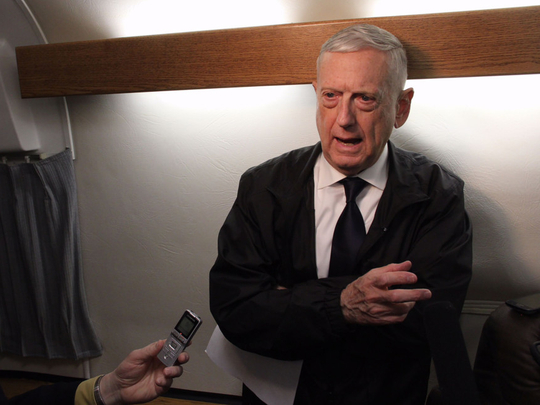
Dubai: Defense Secretary Jim Mattis made a personal appeal to Congress Wednesday not to restrict the United States’ support for the Saudi-led bombing military in Yemen, as the sponsors of a privileged resolution to end Washington’s involvement announced that the Senate would vote on the matter next week.
In a letter sent to congressional leaders Wednesday and obtained by The Washington Post, Mattis wrote that restricting military support the United States is providing to the Saudi-led coalition “could increase civilian casualties, jeopardise cooperation with our partners on counterterrorism, and reduce our influence with the Saudis - all of which would further exacerbate the situation and humanitarian crisis.”
He urged Congress not to impose restrictions on the “noncombat,” “limited US military support” being provided to Saudi Arabia “engaging in operations in its legitimate exercise of self-defense.”
As Mattis put it in his letter to congressional leaders Wednesday, “withdrawing US support would embolden Iran to increase its support to Al Houthis, enabling further ballistic missile strikes on Saudi Arabia and threatening vital shipping lanes in the Red Sea, thereby raising the risk of a regional conflict.”
Mattis’ letter to congressional leaders is a clear attempt to warn senators that if they think the current situation in Yemen is bad, humanitarian suffering will worsen without the continued engagement of the United States.
Mattis sent his letter to leaders on the same day as senators gathered for a closed-door briefing on Yemen from Undersecretary of Defense for Policy John Rood and Deputy Secretary of State John Sullivan, who will take over the State Department after the current secretary, Rex Tillerson, departs his post at the end of the month.
The Saudi-led Arab coalition entered the Yemeni war in 2015 just months after an Al Houthi coup forced internationally-recognised Yemeni president Abd Rabbo Mansour Hadi out of power.
He later was able to escape house arrest and flee to Aden where he temporarily shifted government headquarters.
Since then, the coalition has gained back 86 per cent of Yemeni territory but major population centres still remain under Al Houthi control.
Saudi Arabia and the US have accused Iran of illegally smuggling weapons into Yemen to sustain Al Houthi war efforts.
One such Iranian-made ballistic missile was fired towards Riyadh last month.
Although it was intercepted, Riyadh called it an ‘act of war’.
The war has cost the lives of thousands of Yemenis and pushed the Arab world’s poorest country to the brink of famine.
The latest government push seeks to take advantage of cracks in the awkward Al Houthi alliance with former Yemeni President Ali Abdullah Saleh’s supporters.
Saleh ruled Yemen for more than three decades until he was forced to resign following an Arab Spring uprising in 2011.
He remained in the country, however, and continued to wield power from behind the scenes.
In 2014, his forces allied with Al Houthi militia, despite the fact that as president he had gone to war with them.
There had been simmering tensions between the two awkward allies in past months that boiled over in December when Saleh suggested he would cooperate with Hadi — he was assassinated shortly after.
Since then senior members of Saleh’s party have either been executed or placed under house arrest by Al Houthis amid a draconion crackdown.
While most analysts say that Saleh’s slaying could give Al Houthis the upper hand in the short term, the broken alliance between Al Houthis and forces loyal to Saleh appears to be permanent, which will help the Yemeni government and its backers in the Saudi-led coalition weaken their grip on the country given the reduction in manpower.
-With inputs from Washington Post












